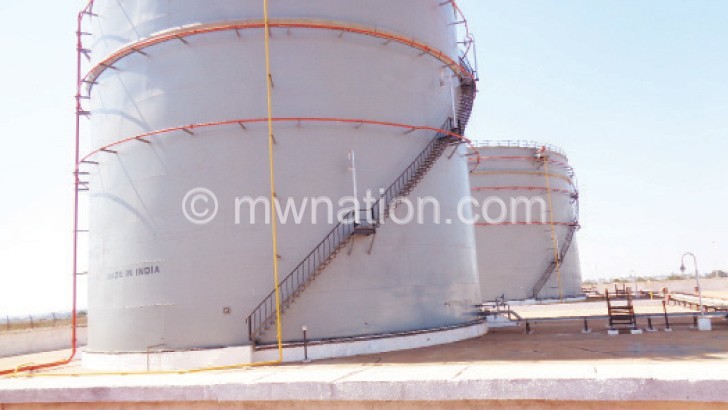Malawi Energy Regulatory Authority (Mera) says although it has been collecting storage levy in the fuel price build-up, it has only gazetted the storage reserve regulations recently.
This puts to rest fears that Mera has added another fuel levy to the seven levies in place.

In an interview yesterday, Mera chief executive officer Collins Magalasi said the energy regulator was using proceeds from the storage levy to pay back $26.5 million (about K20 billion) loan from Export and Import (Exim) Bank of India which was used to construct fuel reserves in Lilongwe, Blantyre and Mzuzu with a combined capacity of 60 million litres.
So far, he said the Malawi Government has repaid K300 million.
“The storage levy started when we were constructing the fuel reserves because this levy is for the strategic fuel reserves which were built with a loan from India through National Oil Company of Malawi [Nocma] but we just gazzetted it recently,” said Magalasi.
Mera has since 2016 added a distribution levy on the fuel price build-up, bringing the number of levies to seven.
According to the latest fuel price build-up of Mera, the levies are energy regulatory levy, which costs K12.50 per litre of petrol, diesel and paraffin; road levy which costs K95.59 for petrol and K96.06 for diesel; Malawi Bureau of Standards (MBS) cess levy at K2.03 for petrol, K2.25 for diesel and K2.31 for paraffin; storage levy at K5 for petrol, diesel and paraffin; rural electrification levy at K39.12 for petrol, diesel and paraffin; distribution fund levy at K4 for petrol, diesel and paraffin and price stabilisation fund (PSF) at K97.84 for petrol, K47.88 for diesel and K22.97 for paraffin.
This means that for every litre of fuel, a total of K256 on petrol, K206.81 on diesel and K85 on paraffin goes to government in form of levies.
Compared to 2016, there has been an increase of 25 percent, seven percent, 124 percent, 340 percent and eight percent for the energy levy, road levy, MBS levy, PSF and rural electrification levy, respectively.
In the review period, storage levy has, however, not been reviewed while the distribution levy is pegged at K4 for petrol, diesel and paraffin.
Malawi Confederation of Chambers of Commerce and Industry (MCCCI) chief executive officer Chancellor Kaferapanjira in an interview said while it is justifiable for Mera to be collecting revenues, the key factor is for the receiving institution to be accountable to ensure that there is no abuse and misallocation.
“Levies must always serve contemporary challenges and not continue when the purpose for which they were introduced is long gone,” he said.
On his part, Consumers Association of Malawi (Cama) executive director John Kapito said the current price build-up is a reflection of the increased costs of various variables while some are as a result of matching up local prices against those within the region.
Lately, the PSF—an account that accumulates funds from fuel sales meant to cushion the price of petroleum on the local market—has been on the spotlight after alleged abuses involving K3 billion that was said to have been diverted to buy maize for Agricultural Development and Marketing Corporation (Admarc) but has only paid K250 million.
Source: The Nation_Tuesday, 23 April, 2019_by Grace Phiri-Staff Reporter
